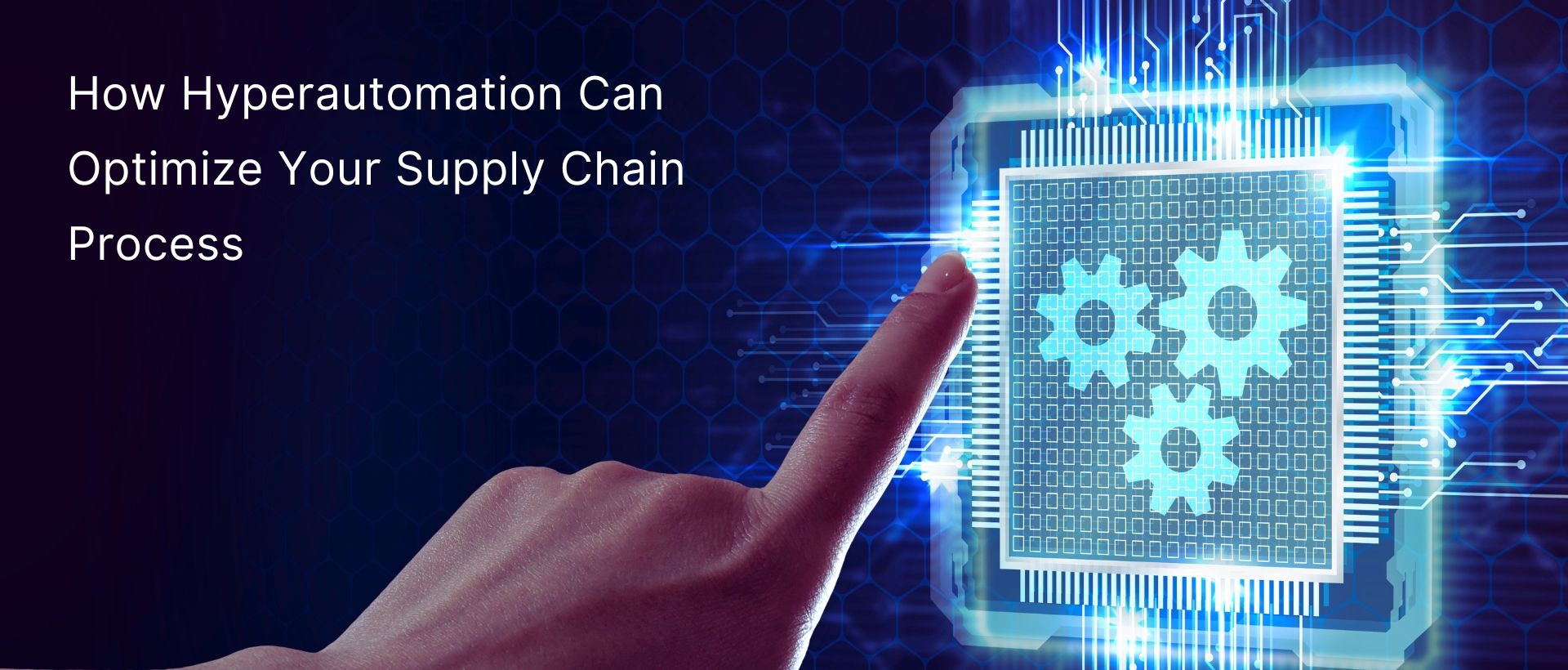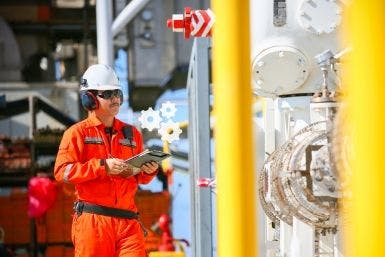
How Hyperautomation Can Optimize Your Supply Chain Process
Are you tired of dealing with manual processes and inefficiencies in your supply chain management? Have you considered implementing hyperautomation to streamline your operations and improve your bottom line? In this blog, we'll explore how hyperautomation can optimize your supply chain process and why it's worth considering.

Ennuviz
Company
Table of content
Hyperautomation is the application of modern technologies such as artificial intelligence, machine learning, and robotic process automation (RPA) to automate and improve business operations. It goes beyond standard automation by merging different technologies in order to create a more intelligent and efficient system.
Supply chain management is a complicated process that involves the coordination of numerous activities such as sourcing, procurement, production, transportation, and distribution. The ultimate purpose of supply chain management is to guarantee that items are supplied to customers in a timely and cost-effective way. However, supply chain management is not without its difficulties. Here, we will discuss some of the key challenges of supply chain management.
One of the biggest challenges of supply chain management is the lack of visibility. Many companies have a fragmented supply chain, which makes it difficult to track products from the point of origin to the point of consumption. This lack of visibility can lead to delays, lost products, and increased costs. To overcome this challenge, companies need to invest in technology that provides real-time visibility into their supply chain.
Globalization has made supply chain management more complex than ever before. Companies now have to deal with suppliers, manufacturers, and customers from all over the world. This can lead to cultural and language barriers, as well as different regulations and laws. To overcome this challenge, companies need to have a global strategy that takes into account the unique needs of each region.
Inventory management is another challenge of supply chain management. Companies need to balance the cost of holding inventory with the risk of stockouts. This can be difficult, especially if demand is unpredictable. To overcome this challenge, companies need to have a robust forecasting system that takes into account historical data, market trends, and customer behavior.
Supplier relationships are critical to the success of supply chain management. However, managing supplier relationships can be challenging. Companies need to ensure that their suppliers are reliable, ethical, and compliant with regulations. This can be difficult, especially if suppliers are in different parts of the world. To overcome this challenge, companies need to have a supplier management system that monitors supplier performance and identifies potential risks.
Lack of visibility, globalization, inventory management, and supplier relationships are just a few of the challenges that companies face. However, with the right strategy and technology, these challenges can be overcome. Companies that invest in their supply chain management will be better positioned to meet the needs of their customers and succeed in today's global marketplace.
Streamlining the supply chain process is an important step for any company looking to improve its operations and increase efficiency.
Hyperautomation can help streamline procurement processes by automating tasks such as purchase order creation, vendor selection, and invoice processing. With the help of machine learning algorithms, hyperautomation can analyze historical data to identify the best vendors for specific products and services, negotiate better prices, and reduce the risk of fraud.
Hyperautomation can also help optimize inventory management by providing real-time visibility into inventory levels, demand forecasts, and supply chain disruptions. By automating inventory tracking and replenishment, organizations can reduce stockouts, overstocking, and excess inventory, which can lead to significant cost savings.
Hyperautomation can also help optimize logistics and transportation by automating tasks such as route planning, carrier selection, and shipment tracking. With the help of artificial intelligence, hyperautomation can analyze data from multiple sources such as weather forecasts, traffic patterns, and delivery schedules to optimize delivery routes, reduce transportation costs, and improve delivery times.
Hyperautomation can also help enhance the customer experience by providing real-time updates on order status, delivery times, and product availability. By automating customer service tasks such as order tracking and returns processing, organizations can improve customer satisfaction and loyalty.
Hyperautomation can bring significant benefits to your supply chain, including:
Hyperautomation can automate manual and repetitive tasks, such as data entry and order processing, freeing up your employees to focus on more complex and strategic tasks. This can lead to faster and more accurate processing times, reducing errors and delays.
Hyperautomation can provide real-time visibility into your supply chain, allowing you to track inventory levels, monitor shipments, and identify potential bottlenecks. This can help you make more informed decisions and respond quickly to any issues that arise.
Hyperautomation can help you adapt to changing market conditions and customer demands by enabling you to quickly adjust your supply chain processes. This can help you stay competitive and meet customer expectations.
Hyperautomation can reduce labor costs and improve operational efficiency, leading to cost savings across your supply chain. Additionally, it can help you avoid costly errors and delays that can impact your bottom line.
The supply chain industry has undergone significant changes in recent years, and it is expected to continue to do so. One of the most significant trends that will shape the future of supply chain management is hyperautomation.
Hyperautomation refers to the use of advanced technologies such as artificial intelligence (AI), machine learning (ML), and robotic process automation (RPA) to automate complex business processes. In the context of supply chain management, hyperautomation can help organizations streamline their operations, reduce costs, and improve efficiency.
One of the key benefits of hyperautomation is that it can help organizations make better decisions by providing real-time insights into their operations. For example, AI-powered predictive analytics can help organizations anticipate demand and optimize their inventory levels accordingly. Similarly, ML algorithms can analyze data from multiple sources to identify patterns and anomalies, enabling organizations to detect and address issues before they become major problems.
Another benefit of hyperautomation is that it can help organizations reduce errors and improve accuracy. By automating repetitive tasks such as data entry and order processing, organizations can minimize the risk of human error and improve the quality of their data. This, in turn, can help organizations make better decisions and improve their overall performance.
Hyperautomation can also help organizations improve their customer service by providing faster and more accurate responses to customer inquiries. For example, chatbots powered by AI can provide customers with instant answers to their questions, reducing the need for human intervention and improving the customer experience.
Overall, hyperautomation is poised to revolutionize the supply chain industry by enabling organizations to automate complex processes, improve efficiency, and reduce costs. As organizations continue to adopt these technologies, they will be better equipped to compete in an increasingly complex and dynamic business environment.
Implementing hyperautomation in your supply chain can seem daunting, but it doesn't have to be. Here are some steps to get started:
- 1. Identify the processes that would benefit most from automation.
- 2. Evaluate the available technologies and choose the ones that best fit your needs.
- 3. Develop a plan for implementing and integrating the technologies into your existing systems.
- 4. Train your employees in the new processes and technologies.
- 5. Monitor and evaluate the results to ensure that you're achieving your desired outcomes.
Hyperautomation can bring significant benefits to your supply chain, including improved efficiency, enhanced visibility, increased flexibility, and cost savings. By identifying the right processes and technologies and developing a solid implementation plan, you can optimize your supply chain and stay ahead of the competition. So why not consider hyperautomation for your business? Talk to our experts today to get the free discovery call on how to start automating your supply chain operations.
What is Hyperautomation?
Hyperautomation is the application of modern technologies such as artificial intelligence, machine learning, and robotic process automation (RPA) to automate and improve business operations. It goes beyond standard automation by merging different technologies in order to create a more intelligent and efficient system.
The Challenges of Supply Chain Management
Supply chain management is a complicated process that involves the coordination of numerous activities such as sourcing, procurement, production, transportation, and distribution. The ultimate purpose of supply chain management is to guarantee that items are supplied to customers in a timely and cost-effective way. However, supply chain management is not without its difficulties. Here, we will discuss some of the key challenges of supply chain management.
Lack of Visibility
One of the biggest challenges of supply chain management is the lack of visibility. Many companies have a fragmented supply chain, which makes it difficult to track products from the point of origin to the point of consumption. This lack of visibility can lead to delays, lost products, and increased costs. To overcome this challenge, companies need to invest in technology that provides real-time visibility into their supply chain.
Globalization
Globalization has made supply chain management more complex than ever before. Companies now have to deal with suppliers, manufacturers, and customers from all over the world. This can lead to cultural and language barriers, as well as different regulations and laws. To overcome this challenge, companies need to have a global strategy that takes into account the unique needs of each region.
Inventory Management
Inventory management is another challenge of supply chain management. Companies need to balance the cost of holding inventory with the risk of stockouts. This can be difficult, especially if demand is unpredictable. To overcome this challenge, companies need to have a robust forecasting system that takes into account historical data, market trends, and customer behavior.
Supplier Relationships
Supplier relationships are critical to the success of supply chain management. However, managing supplier relationships can be challenging. Companies need to ensure that their suppliers are reliable, ethical, and compliant with regulations. This can be difficult, especially if suppliers are in different parts of the world. To overcome this challenge, companies need to have a supplier management system that monitors supplier performance and identifies potential risks.
Lack of visibility, globalization, inventory management, and supplier relationships are just a few of the challenges that companies face. However, with the right strategy and technology, these challenges can be overcome. Companies that invest in their supply chain management will be better positioned to meet the needs of their customers and succeed in today's global marketplace.
Supply Chain Operations Improvement
Streamlining the supply chain process is an important step for any company looking to improve its operations and increase efficiency.
Streamlining Procurement Processes
Hyperautomation can help streamline procurement processes by automating tasks such as purchase order creation, vendor selection, and invoice processing. With the help of machine learning algorithms, hyperautomation can analyze historical data to identify the best vendors for specific products and services, negotiate better prices, and reduce the risk of fraud.
Enhancing Inventory Management
Hyperautomation can also help optimize inventory management by providing real-time visibility into inventory levels, demand forecasts, and supply chain disruptions. By automating inventory tracking and replenishment, organizations can reduce stockouts, overstocking, and excess inventory, which can lead to significant cost savings.
Improving Logistics and Transportation
Hyperautomation can also help optimize logistics and transportation by automating tasks such as route planning, carrier selection, and shipment tracking. With the help of artificial intelligence, hyperautomation can analyze data from multiple sources such as weather forecasts, traffic patterns, and delivery schedules to optimize delivery routes, reduce transportation costs, and improve delivery times.
Enhancing Customer Experience
Hyperautomation can also help enhance the customer experience by providing real-time updates on order status, delivery times, and product availability. By automating customer service tasks such as order tracking and returns processing, organizations can improve customer satisfaction and loyalty.
How Can Hyperautomation Benefit Your Supply Chain?
Hyperautomation can bring significant benefits to your supply chain, including:
Improved Efficiency
Hyperautomation can automate manual and repetitive tasks, such as data entry and order processing, freeing up your employees to focus on more complex and strategic tasks. This can lead to faster and more accurate processing times, reducing errors and delays.
Enhanced Visibility
Hyperautomation can provide real-time visibility into your supply chain, allowing you to track inventory levels, monitor shipments, and identify potential bottlenecks. This can help you make more informed decisions and respond quickly to any issues that arise.
Increased Flexibility
Hyperautomation can help you adapt to changing market conditions and customer demands by enabling you to quickly adjust your supply chain processes. This can help you stay competitive and meet customer expectations.
Cost Savings
Hyperautomation can reduce labor costs and improve operational efficiency, leading to cost savings across your supply chain. Additionally, it can help you avoid costly errors and delays that can impact your bottom line.
The Future of Supply Chain Management with Hyperautomation
The supply chain industry has undergone significant changes in recent years, and it is expected to continue to do so. One of the most significant trends that will shape the future of supply chain management is hyperautomation.
Hyperautomation refers to the use of advanced technologies such as artificial intelligence (AI), machine learning (ML), and robotic process automation (RPA) to automate complex business processes. In the context of supply chain management, hyperautomation can help organizations streamline their operations, reduce costs, and improve efficiency.
One of the key benefits of hyperautomation is that it can help organizations make better decisions by providing real-time insights into their operations. For example, AI-powered predictive analytics can help organizations anticipate demand and optimize their inventory levels accordingly. Similarly, ML algorithms can analyze data from multiple sources to identify patterns and anomalies, enabling organizations to detect and address issues before they become major problems.
Another benefit of hyperautomation is that it can help organizations reduce errors and improve accuracy. By automating repetitive tasks such as data entry and order processing, organizations can minimize the risk of human error and improve the quality of their data. This, in turn, can help organizations make better decisions and improve their overall performance.
Hyperautomation can also help organizations improve their customer service by providing faster and more accurate responses to customer inquiries. For example, chatbots powered by AI can provide customers with instant answers to their questions, reducing the need for human intervention and improving the customer experience.
Overall, hyperautomation is poised to revolutionize the supply chain industry by enabling organizations to automate complex processes, improve efficiency, and reduce costs. As organizations continue to adopt these technologies, they will be better equipped to compete in an increasingly complex and dynamic business environment.
Getting Started with Hyperautomation
Implementing hyperautomation in your supply chain can seem daunting, but it doesn't have to be. Here are some steps to get started:
- 1. Identify the processes that would benefit most from automation.
- 2. Evaluate the available technologies and choose the ones that best fit your needs.
- 3. Develop a plan for implementing and integrating the technologies into your existing systems.
- 4. Train your employees in the new processes and technologies.
- 5. Monitor and evaluate the results to ensure that you're achieving your desired outcomes.
Conclusion
Hyperautomation can bring significant benefits to your supply chain, including improved efficiency, enhanced visibility, increased flexibility, and cost savings. By identifying the right processes and technologies and developing a solid implementation plan, you can optimize your supply chain and stay ahead of the competition. So why not consider hyperautomation for your business? Talk to our experts today to get the free discovery call on how to start automating your supply chain operations.
Recommended Blogs

Let's get started today
Because we put you first. Our customer-obsessed working model honors client's needs.
Schedule DemoJoin our Newsletter. Stay Connected
Empowering Leaders to Transform the Future
Fuel your ambition with expert insights and strategies to drive your Business Transformation. For growth-minded leaders, this is where innovation meets opportunity. Stay bold and lead the curve!

 Ennuviz
Ennuviz


 Ajay Sharma
Ajay Sharma